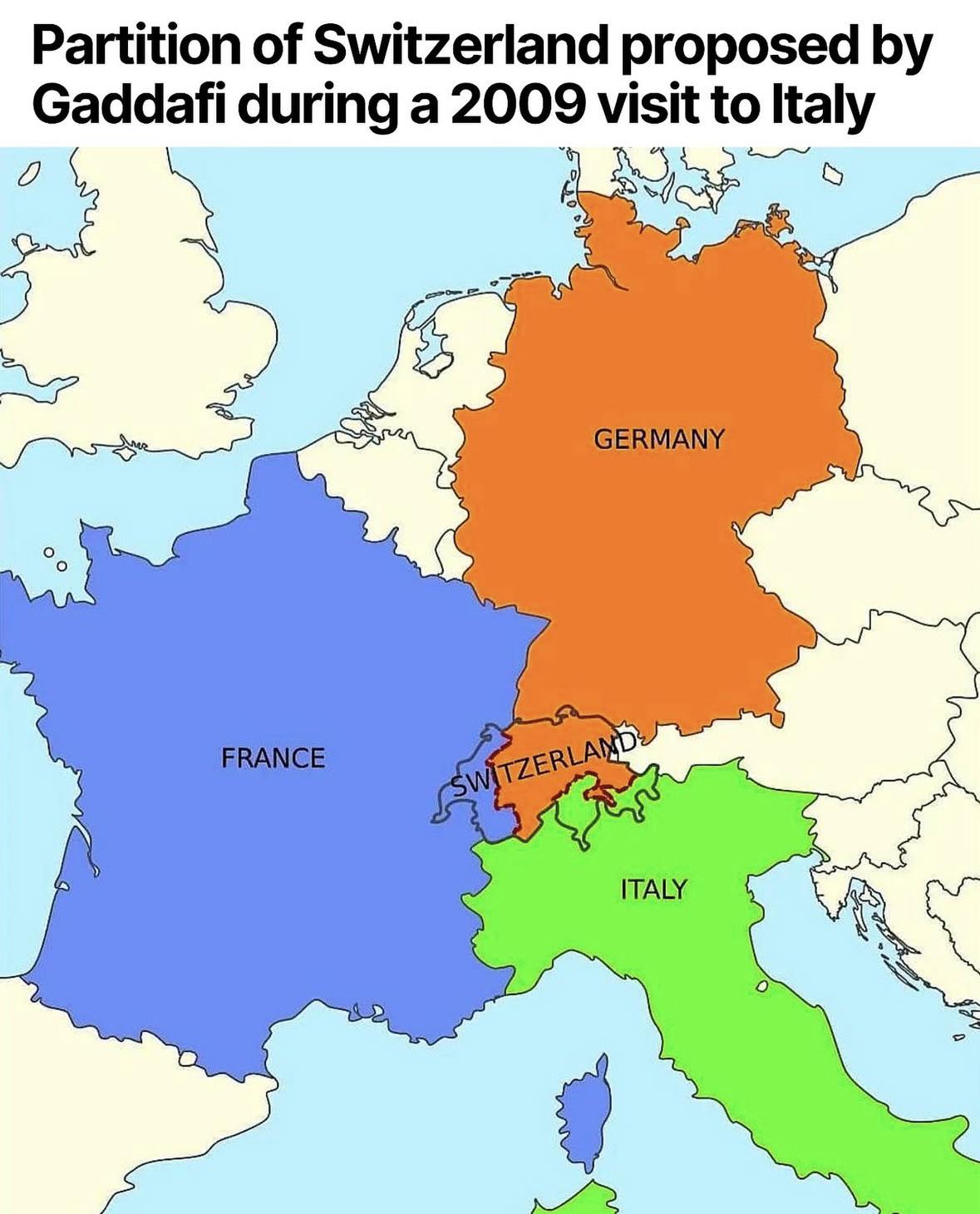Map of Gaddafi's Proposed Partition of Switzerland


David Chen
Data Visualization Specialist
David Chen is an expert in transforming complex geographic datasets into compelling visual narratives. He combines his background in computer science ...
Geographic Analysis
What This Map Shows
This map visualizes the radical proposal made by Muammar Gaddafi in 2009 during his visit to Italy, where he called for the partition of Switzerland. Gaddafi suggested that the country should be divided among its neighboring countries: Germany, France, and Italy. The map outlines the proposed divisions, indicating which regions would be allocated to each neighboring nation based on linguistic lines. The German-speaking areas were to be ceded to Germany, the French-speaking regions to France, and the Italian-speaking canton of Ticino to Italy. This bizarre proposal was fueled by Gaddafi's outrage over the detention of his son by Swiss authorities in 2008, branding Switzerland as a “mafia state.” This visual representation serves as a reminder of diplomatic tensions and the complexities of national identity.
Deep Dive into Switzerland's Linguistic and Cultural Landscape
Switzerland is a remarkable mosaic of languages, cultures, and traditions. It has four official languages: German, French, Italian, and Romansh, each reflecting the diverse history and culture of the regions they dominate. Interestingly, around 63% of the Swiss population speaks German, primarily in the central and northern regions, while French is spoken by about 23% of the population, mainly in the west. Italian speakers, a minority at about 8%, primarily reside in the southern canton of Ticino. Romansh, although the least spoken, represents a significant cultural heritage in the country.
The linguistic divisions are not just a matter of language; they also reflect unique cultural identities and historical developments. For instance, the German-speaking regions are known for their strong industrial base and economic prowess, while the French-speaking areas are often associated with diplomacy and international organizations, housing the United Nations Office in Geneva. The Italian-speaking Ticino, on the other hand, showcases a blend of Swiss and Italian cultures, reflected in its cuisine, architecture, and lifestyle.
What’s fascinating is how these linguistic and cultural differences play a crucial role in Swiss politics and governance. The federal structure of Switzerland allows for a high degree of autonomy, enabling cantons to maintain their unique identities while contributing to the nation’s unity. This balance is pivotal in a country where direct democracy thrives, and citizens often engage in referendums that reflect diverse regional interests.
Regional Analysis
In analyzing the proposed partition, we can see how Gaddafi's suggestions would dramatically affect each linguistic region. The German-speaking cantons, including Zurich and Bern, are not only economic powerhouses but also hubs of innovation, education, and finance. Integrating these areas into Germany might lead to economic shifts, given that Germany has a larger economy and different labor policies.
Conversely, the French-speaking regions, particularly Geneva and Vaud, are centers of international diplomacy and finance. If these areas were transferred to France, it could alter their global roles significantly. The implications of such a change would be profound, affecting everything from economic partnerships to cultural exchanges.
The Italian-speaking canton of Ticino, with its strong ties to northern Italy, might not have seen as significant a shift. However, it could have raised questions about identity and governance, considering the historical and cultural connections that already exist across the border.
Interestingly, each region's reaction to Gaddafi's proposal would likely differ based on their current political sentiments and cultural identities. Would the German-speaking regions embrace integration with Germany, or would they resist such a drastic change? What about the French-speaking areas that pride themselves on their neutrality and international standing?
Significance and Impact
Gaddafi's proposal, while largely dismissed, highlights the underlying tensions that can arise from cultural and linguistic divisions within nations. It serves as a reminder of how geopolitical dynamics can influence national identity and relationships between neighbors. The idea of partitioning a country based on linguistic lines raises questions about sovereignty, nationalism, and the very nature of statehood.
Moreover, in today’s globalized world, where migration and multiculturalism are on the rise, understanding regional identities becomes crucial. The Swiss model demonstrates how a country can thrive by embracing its diversity rather than allowing it to create divisions. This is particularly relevant in discussions about national unity and identity in the face of global challenges.
As we look toward the future, one cannot help but ponder: How will nations navigate their cultural and linguistic landscapes in an increasingly interconnected world? Will we see more proposals like Gaddafi’s, or will countries find innovative ways to celebrate their diversity while maintaining unity? The answers to these questions will shape the geopolitical landscape for years to come.
Visualization Details
- Published
- August 18, 2025
- Views
- 116
Comments
Loading comments...